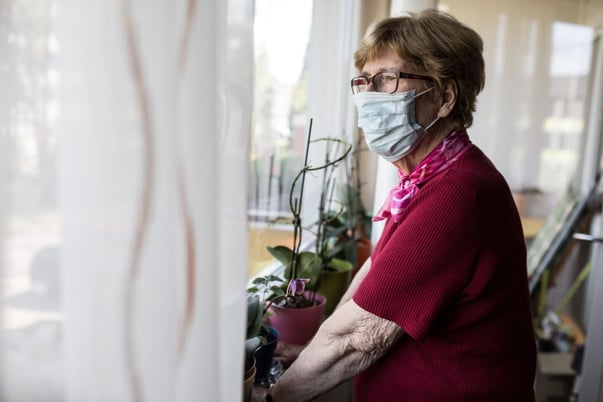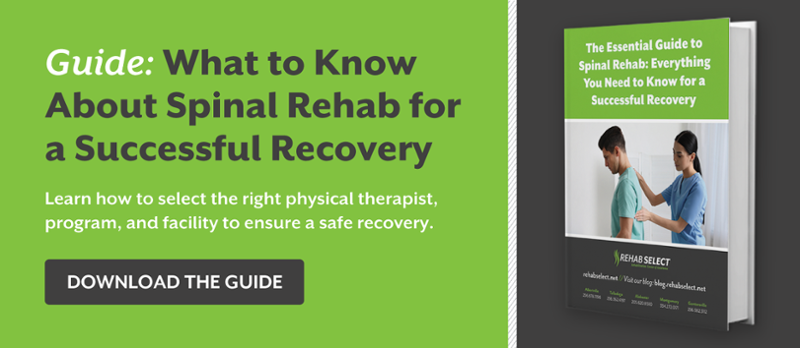
In the US, coronavirus has caused over 40,000 deaths as of April 21, 2020, the highest percentage of whom are over the age of 65. The risks of coronavirus have impacted one particular group the hardest: patients of long-term care facilities. The level of care provided isn’t the problem; it’s the unique setting and medical statuses of the residents that pose the biggest risk.
Typically, residents of these facilities tend to be an older demographic with underlying medical conditions who live in shared living spaces. This particular combination of factors makes residents of rehabilitation centers highly susceptible to risk.
Let’s take a closer look at the risk factors for coronavirus and how to keep your family members safe.
Who’s at the highest risk for COVID-19?
There are two factors that impact your risk for COVID-19: The risk of exposure and the risk of severe illness.
Highest risk of exposure
Those at the highest risk of being exposed to the virus are people who are in close contact with others who have the virus, such as healthcare workers, men and women in long-term care facilities, travelers, and travel-related workers. The more people you come into contact with, especially without taking proper precautions, the higher your risk of exposure.
Communities in every state have been affected, and anyone of any age can be infected. It’s helpful to assume the virus is in your community and to act accordingly.
Highest risk for severe illness
If you contract the virus, there’s no way to tell how it will affect you. People of every age have reactions that range from asymptomatic to deadly.
However, the CDC reports that certain people are at higher risk for complications from the coronavirus. They include:
- Men and women over 65
- Residents of long-term care centers
- Anyone with underlying conditions such as diabetes, heart disease, or lung conditions
- Adults and children with compromised immune systems
- People with obesity
Hospitalization and mortality rates are higher among these populations. The coronavirus poses real dangers to older generations with underlying health conditions.
What causes the risk to be higher in long-term care residents?
One of the reasons why the coronavirus poses such a risk is due to how highly contagious it is. Coronavirus appears to spread much more easily than other viruses and sticks around on surfaces for extended periods. Because the virus is brand new, none of us have any sort of immunity from it either.
COVID-19 also has a higher mortality rate than the flu and other viral diseases. Seniors and those with chronic conditions are at a higher risk than the general population due to the following: immune function decline, vulnerability to complications, and close contact with other people.
Poor immune function
Health conditions and age both affect your body’s immune function. Your immune system is designed to identify and destroy unhealthy cells to reduce or avoid infection. As we age, our immune systems naturally get weaker.
If you have lower immune function, then your body can’t fight against viruses as well as a healthy immune system can. You may be more susceptible to getting sick and experiencing complications from sickness.
Vulnerability to complications
Reports show hospitalization and life-threatening complications are much higher among men and women over 65. The virus can lead to dangerous complications such as:
- Shortness of breath
- Prolonged fever
- Pneumonia in both lungs
- Organ failure
- Death
Comorbid conditions further complicate matters. Asthma, COPD and other lung conditions, for example, are already associated with decreased lung function and breathing difficulties. The coronavirus can further exacerbate those breathing problems as it invades the respiratory system.
Adults with heart disease, diabetes, and other chronic conditions are also at higher risk for developing severe illness from the virus. These conditions may interfere with your body’s ability to overcome coronavirus.
Increased social interaction
We know now that close contact with other people contributes to the spread of coronavirus. If you think about the living situation at a long-term care facility, you can see how shared living areas, communal activities, and close contact among residents can create an environment where a contagious virus like COVID-19 can spread easily.
That’s why extreme caution and practices like social distancing are so imperative, especially in a rehab facility or long-term care environment. We’ve seen in the news how deadly the effects of unchecked exposure can be at facilities like Life Care Center in Kirkland, Washington.
How we at Rehab Select are protecting your loved one
It’s important for all inpatient facilities to take extreme cautionary measures to reduce the spread of the coronavirus. We are taking care to be responsive to the changing protocols to reduce risk for our residents.
According to the CDC, all long-term care facilities should follow the following protocol:
- Restrict visitors and nonessential personnel
- Avoid communal meals and gatherings
- Sanitize rooms and common areas
- Screen employees before each shift
- Practice proper hygiene and protective measures
Current orders from Governor Ivey in Alabama align with these guidelines and require all long-term care facilities and nursing homes to prohibit all visitors and non-essential healthcare personnel.
Despite the latest developments, quality of care and access to appropriate healthcare and resources will not be compromised. We are coming up with clever ways to keep residents engaged and mentally stimulated while protecting their health such as Spirit Week, “Staying Alive” videos, and a family parade.
How you can protect your loved ones during inpatient rehabilitation
It’s important that we all do our part together to protect ourselves, our families, community members, and everyone else. The responsible response is to limit exposure by staying home and finding other ways to connect to protect those at most risk.
Social distancing and Stay at Home orders are the most effective tools we have right now to provide the best possible outcome for everyone, especially those most vulnerable. Although these restrictions may leave you unable to visit your loved ones in inpatient care, you might feel reassured knowing that they have 24-hour access to our qualified, compassionate healthcare.
It’s also important to remember that this abnormal situation is only temporary and that everyone is experiencing this together. You will be together again.
If you’d like to read more about Rehab Select, find out what our patients have to say. To learn more about long-term care in Alabama, download our comprehensive guide that outlines vital information for how to make an informed choice when selecting the best care for your loved one.






